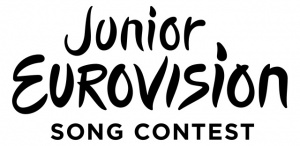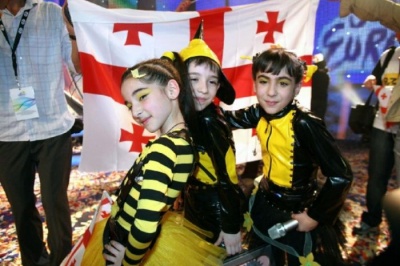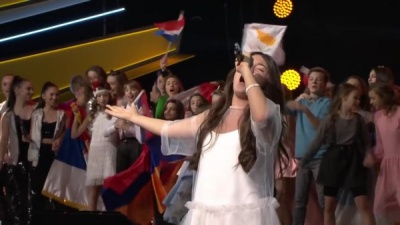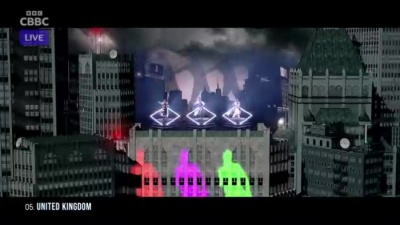Junior Eurovision Song Contest
Contents |
Host
ITV heats:
Mark Durden-Smith and Tara Palmer-Tomkinson (2003)
Michael Underwood, Stephen Mulhern and Holly Willoughby (2004)
Michael Underwood and Nikki Sanderson (2005)
Co-hosts
Commentary (TV: English):
Mark Durden-Smith and Tara Palmer-Tomkinson (2003)
Matt Brown (2004)
Michael Underwood (2005)
Stifyn Parri (2018-19)
Lauren Layfield and HRVY (2022-23)
Commentary (TV: Welsh):
Trystan Ellis-Morris (2018-19)
Commentary (Radio):
Ewan Spence (2013-20)
Luke Fisher (2013)
Glen Bartlett (2014-15)
Lisa-Jayne Lewis (2016-17)
Ben Robertson (2018-19)
Broadcast
Carlton for ITV1, 6 September 2003 and 15 November 2003
Granada for ITV2, 4 September 2004, 20 November 2004, 3 September 2005 and 26 November 2005
98.8 Castle FM, 30 November 2013
Radio Six International for K107, 15 November 2014; for Fun Kids Radio, 21 November 2015 to 24 November 2019; self-published, 29 November 2020
Rondo Media for S4C, 25 November 2018 and 24 November 2019
CBBC and BBC One, 11 December 2022
CBBC and BBC Two, 26 November 2023
Synopsis
In 2003, the EBU started doing a Junior version of the Eurovision Song Contest, which is held in November each year. It has properly high production values, so high in fact that when ITV realised how much money it would cost to put it on they stepped out when it was their turn to host it.
The first edition rated so poorly on ITV (who bought the rights to it when the BBC declined) that the next two contests aired on ITV2, before being dropped altogether the following year. Despite not being broadcast on any UK TV channel, viewers in the UK could still watch the contest via a live webstream made available during the event.
The winning country doesn't necessarily hold the next one (as apparently it would put too much pressure on the kids, as opposed to singing for the whole of Europe). There is an upper age limit to the contestants, songs must be mostly in a language local for the broadcaster, and - in the early years - singers had to write the lyrics and the melodies.
After a strong opening few years, the Junior contest suffered as many Western countries withdrew, the contest was dominated by twee songs, and technical problems made the 2012 show difficult to watch. The EBU forced something of a reset in 2013, most notably moving the focus up from tweens aged 8-12 to teens 10-15. It proved the making of the show, allowing more mature entries and performances. A shift from Saturday night to early Sunday evening ensured young viewers in Eastern Europe could watch the show without staying up past midnight.
Some ideas from Junior have made their way to the Senior contest: introducing the competitors at the start of the show, not announcing every vote from the juries, and using pre-recorded backing vocals. Others - like the language rule, drawing the first and last songs at random, everyone pitching in on a common song, or replacing the telephone vote by an online vote - remained hallmarks of the Junior contest.
The show returned to UK broadcast media in 2013, with Ewan Spence and Luke Fisher delivering the EBU commentary, and securing rights to broadcast on Castle FM in Edinburgh. The 2014 radio commentary was distributed by Glasgow-based Radio Six International, and taken by community station K107 in Kirkcaldy. From 2015 to 2019, the commentary was been heard on children's station Fun Kids, with near-national coverage on DAB after 2016. Radio Six did not pursue rights for the 2021 contest.
A competititve UK return took place in 2018. Welsh-language channel S4C had the short series Chwilio am Seren to find a singer for that year's contest. After two years of very modest results, and facing a budget shortfall, and with a pandemic raging, S4C withdrew before the 2020 contest.
By its twentieth anniversary, Junior Eurovision had found a niche. It's a meeting of like-minded children, there to show what they can do, make friends and have fun. The competition is not the main aim, it's a less pressured and less commercial environment than the adults' competition. Smaller broadcasters - like S4C and Irish-language broadcaster TG4 - can take part, and show their culture to the rest of Europe. Entries from Georgia and Armenia had won a lot of contests, staged the contest, and shown their prowess to the rest of Europe. Not that the big broadcasters were sidelined - Italy won on their first entry, and France dominated in the early 2020s.
Junior Eurovision was also a proving ground for the host of next year's Senior contest. Amongst other things, the Eurovision network is a way for broadcasters to share knowledge and skills. RTP and KAN had taken part in the months before hosting the contest in Portugal and Israel. The BBC followed suit in 2022. The United Kingdom broadcaster was eager to see just how the experts put on a stupendous show, and absorb ideas for the senior contest in May 2023; a top five performance ensured the Beeb would remain in the contest.
Web links
See also
Weaver's Week reviews: 2005, 2014, 2015, 2016, 2017, 2018, 2019, 2020, 2021, 2022, 2023.





